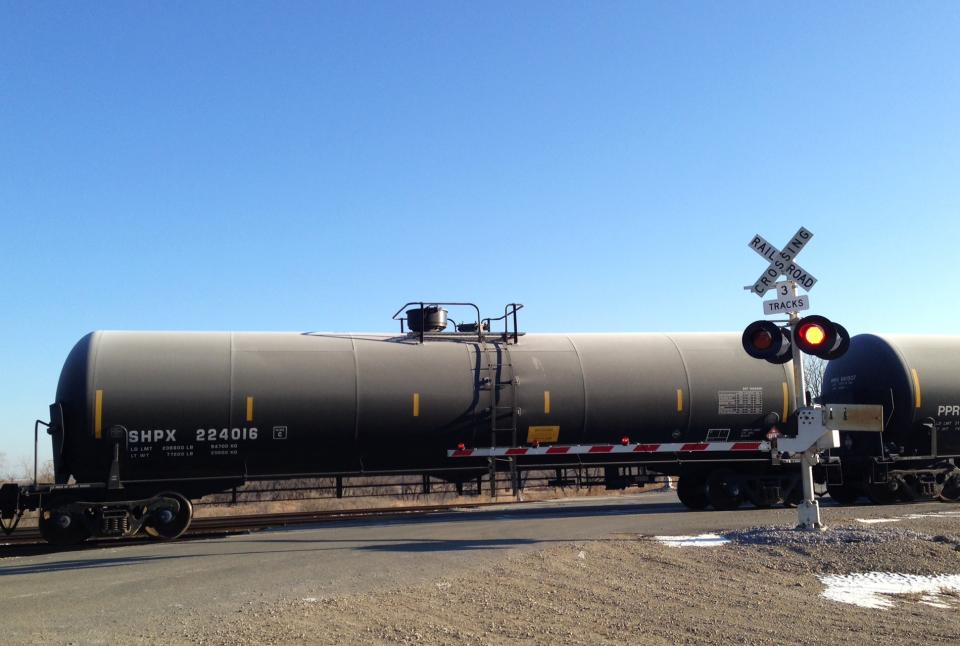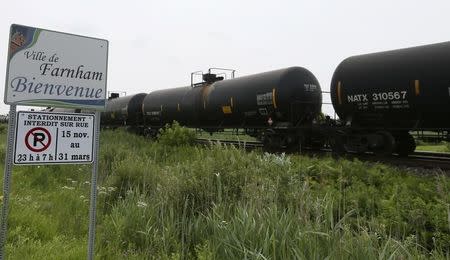Exclusive - Canada insists on oil train tanker phase-out ahead of U.S
By Patrick Rucker and David Ljunggren WASHINGTON/OTTAWA (Reuters) - Canada is committed to taking outmoded tank cars off the rails years earlier than U.S. officials envision, sources familiar with negotiations say, leaving the trading partners at an impasse as they try to harmonize oil train safety measures. In the wake of the 2013 Lac-Megantic disaster, in which 47 people died after an oil train derailed and blew up in Canada, both nations agreed to retire older versions of the tank car model involved in that tragedy, the DOT-111. The roughly 60,000 such cars now in service constitute more than half the North American tank car fleet, and the model has been a workhorse in North Dakota's Bakken energy patch. The United States wants to stop large-scale shipments of the most volatile crude in older DOT-111 cars by October 2017 and to halt all such fuel deliveries in that model by October 2020. Canada wants fuel deliveries in the older wagons to end by May 2017. The oil industry has said the Canadian timetable is unrealistic. In a sign of concern, U.S. Transport Secretary Anthony Foxx flew to Toronto last month for talks with Canadian Transport Minister Lisa Raitt in which the two discussed whether Canada's pace for retiring DOT-111 tankers was realistic. Sources familiar with the two-hour meeting said Raitt insisted Canada would not relax the timetable. "Let's give the industry something to shoot for and then work out the details. That's her view," said one official familiar with the meeting. With the Canadian deadline in place, U.S. industry would still have room to propose how it could comply or even seek an extension, said one source familiar with the file. A spokeswoman for Raitt told Reuters: "I can confirm that the May 2017 deadline for crude carrying DOT-111s remains." Officials from the Canadian transport ministry are due in Washington on Thursday to discuss the issue with American counterparts. U.S. officials want safety standards that are strong and workable "which is why we proposed phasing out the use of DOT-111s in the highest risk categories first," said Department of Transportation spokeswoman Susan Lagana. CLOSE TIES The rail industry is deeply integrated across the two countries so U.S. and Canadian officials strive to harmonize safety standards even as they follow their own rule-writing processes. Complying with two sets of rail safety standards could be an operational headache but industry is already bracing for tougher rules. Tank cars are being built that are more puncture-resistant and less prone to explode than older DOT-111 models. Canadian officials want that hardened design, known as a CPC-1232 model, to be adopted until regulators can endorse a final form. Canada has not yet offered a comprehensive oil train safety plan to address other issues such as routing, braking systems and how to classify volatile crude oil. The United States does have such a plan, which it outlined in July. The White House Office of Information and Regulatory Affairs (OIRA) is now weighing the costs and benefits of that proposal, which has drawn more than 3,800 public comments. Community leaders want regulators to demand that the heaviest, most costly tank cars be used in the future. But such a mandate would send thousands of expensive tankers to a smelter without improving safety, the oil and tank car industries argue. Howard Shelanski, the OIRA head, heard Raitt make her case at the Toronto meeting. But he is also hearing from industry leaders who complain that the government's proposal exaggerates safety gains and downplays future consumer costs. The DOT schedule for scrapping tank cars "could harm consumers by disrupting the production and transportation of goods that play major roles in our economy," Jack Gerard, president of the American Petroleum Institute, said in September. If industry does not like the oil train proposal, it could challenge the plan in court. That fight could be costly, prolonged and uncertain, lawyers said. (Reporting By Patrick Rucker; Editing by Peter Galloway)


